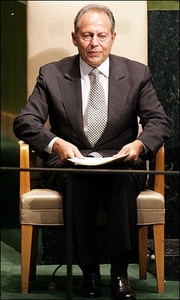 BEIRUT (AFP) – Lebanese leaders return to roundtable talks to discuss possible government changes amid threats to take to the streets by both pro-Damascus Hezbollah and the anti-Syrian parliamentary majority.The crucial talks Sunday follow a warning from French Defence Minister Michele Alliot-Marie on Saturday of the risks of renewed violence on the Lebanon – Isrtael border after the Jewish state’s devastating summer war with Hezbollah.
BEIRUT (AFP) – Lebanese leaders return to roundtable talks to discuss possible government changes amid threats to take to the streets by both pro-Damascus Hezbollah and the anti-Syrian parliamentary majority.The crucial talks Sunday follow a warning from French Defence Minister Michele Alliot-Marie on Saturday of the risks of renewed violence on the Lebanon – Isrtael border after the Jewish state’s devastating summer war with Hezbollah.
The Shiite group Hezbollah has been seeking to cash in on its "divine victory" — for its guerrillas’ fierce resistance to the month-long Israeli offensive – by pressing for a government of national unity.The militant group, which has two representatives in the cabinet, wants more seats in government for its allies, mostly followers of Christian leader Michel Aoun. Influential parliament speaker Nabih Berri has called for the national dialogue among leaders of the various communities to consider a unity government and the adoption of a new electoral law to end the political stalemate.
The parliamentary majority has rejected the demand for a unity government before winning a pledge for the ouster of Damascus protege President Emile Lahoud.
Lahoud’s term was extended for three years in a Syrian-inspired controversial constitutional amendment in September 2004.
The presidential election in the fall of 2007 and the creation of a special tribunal for the trial of suspects in the 2005 murder of anti-Syrian former premier Rafiq Hariri are at the heart of Lebanon’s domestic disputes.
Syrian officials and their Lebanese allies have stood accused of Hariri’s assassination in a Beirut bombing which forced Damascus to end nearly three decades of military domination of Lebanon in April 2005.
The anti-Syrian majority says the country needs a tight government to carry out the post-war reconstruction and reform programme with the help of the international community.
But Hezbollah considers that only a national unity government can lead to stability and prevent Washington from meddling in Lebanon’s affairs.
Hezbollah chief Hassan Nasrallah has threatened to resort to street protests if the roundtable talks fail to help produce a government of national unity within a week from Monday.
In response, anti-Syrian Christian leader Samir Geagea warned his camp was ready to stage counter-demonstartions, while warning that Hezbollah’s demonstration may be used by other pro-Syrian parties to provoke violence.
The White House on Wednesday sounded the alarm over what it called "mounting evidence" that Hezbollah was "preparing plans to topple" the Beirut government in collaboration with their Iranian and Syrian allies.
"Lebanon has fallen victim of a plot that we have to counter in order protect the independence of the country," said a joint statement from anti-Syrian parliamentary leaders MPs Saad Hariri and Walid Jumblatt.
Syria rejects accusations it is trying to topple Beirut’s pro-Western government and insists Lebanon can only be governed through "national unity", while Tehran has also reacted.
"These are repetitive allegations and without foundation. Iran supports the independence, national sovereignty and territorial integrity of Lebanon," Iran’s foreign ministry spokesman Mohammad Ali Hosseini said Sunday.



